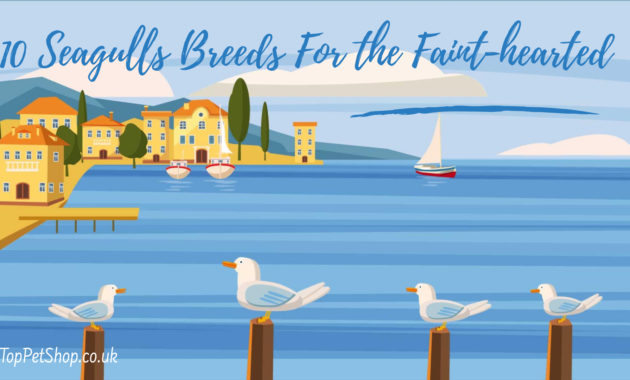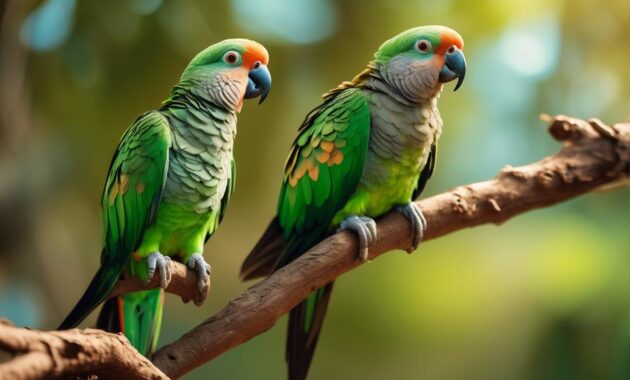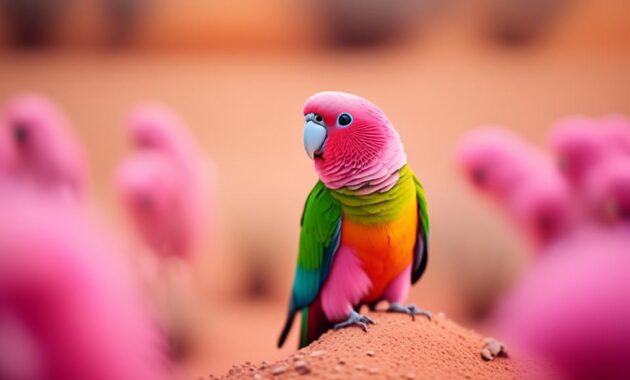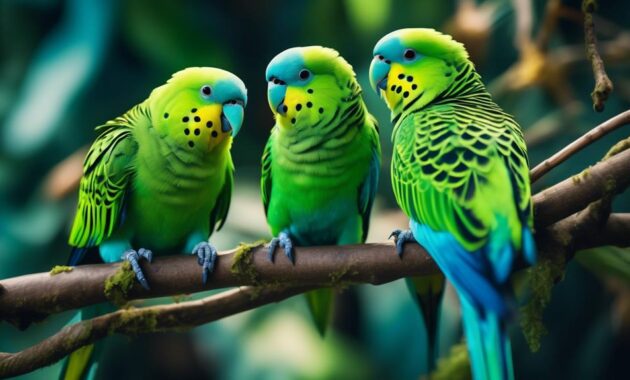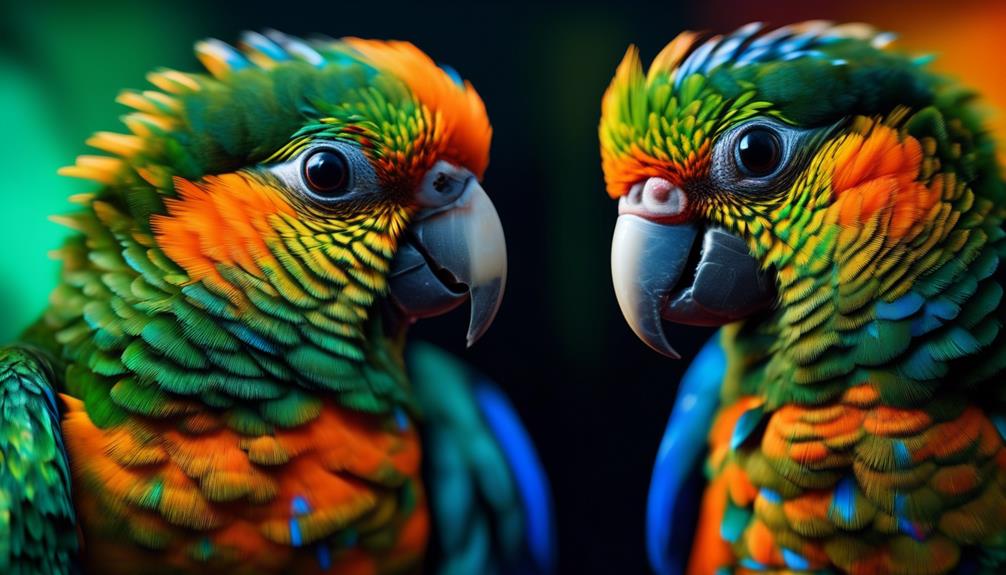
Imagine yourself surrounded by a kaleidoscope of vibrant colors, as you enter the fascinating world of Patagonian Conures. These magnificent birds, found in the rugged landscapes of Argentina and Chile, possess a captivating allure that is hard to resist. With their dark green plumage embellished with vivid accents, these robust parrots are a sight to behold.
But there’s more to these charismatic creatures than meets the eye. In this discussion, we will uncover the secrets of their physical prowess, delve into their intriguing behaviors, and explore their unique bond with humans.
Get ready to be enthralled by the vibrant world of Patagonian Conures and discover the wonders that await you.
Key Takeaways
- Patagonian Conures have dark green feathers with colorful details and can grow up to 18 inches in size.
- They thrive in arid and harsh conditions and make nests in savannahs and open grasslands.
- Patagonian Conures require a lot of space and mental stimulation, and their diet should consist of a conure seed mix.
- They are known for being charming and entertaining companions, with the ability to imitate sounds and interact with their owners.
Physical Characteristics and Natural Habitat
Patagonian Conures are vibrant parrots native to parts of Argentina and Chile, known for their dark green feathers and colorful details. These magnificent birds can grow up to 18 inches in size and have a lifespan of 35+ years.
They thrive in arid and harsh conditions, making their nests in savannahs and open grasslands. As part of a monotypic family, Patagonian Conures are robust and heavily built, with long tails. They require a lot of space and mental stimulation, making them suitable for aviaries, bird rooms, and roomy cages.
These playful and affectionate birds can fly freely around the house, but supervision is necessary to avoid accidents. Their diet consists of a conure seed mix, and they may experience lethargy, obesity, and health issues without enough space.
Overall Description and Care Requirements
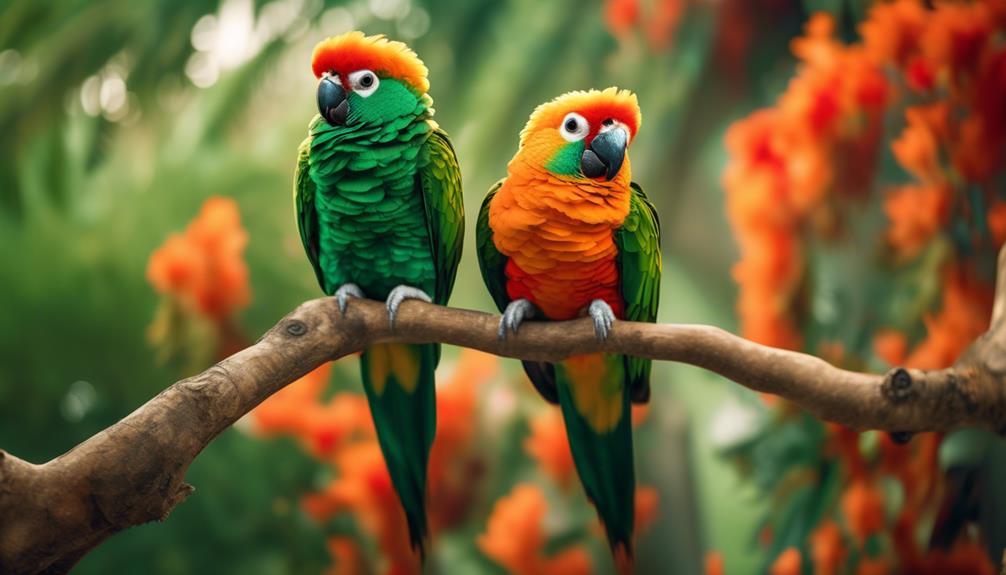
To properly care for Patagonian Conures, it’s important to understand their overall description and the specific care requirements they need. Patagonian Conures are part of a monotypic family and are robust and heavily built with long tails. They require a lot of space and are suitable for aviaries, bird rooms, and roomy cages. Mental stimulation is crucial for their well-being, and they can fly freely around the house.
Their diet should consist of a conure seed mix. Lethargy, obesity, and health issues can arise if they don’t have enough space. Supervision is necessary to avoid accidents. These vibrant birds are vocal and skilled in mimicry, making them best suited for household settings. They’re naturally entertaining and playful, bonding deeply with humans and enjoying head scratches and belly rubs.
Speech and Sounds
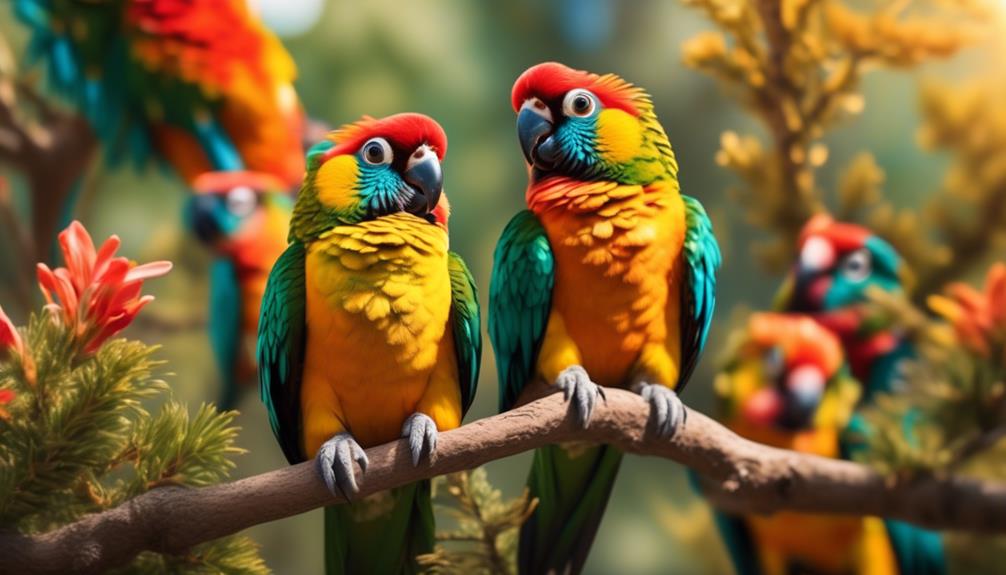
When it comes to speech and sounds, Patagonian Conures are highly vocal and skilled in mimicry. Here are four key points to understand about their communication abilities:
- Accurate Repetition: Patagonian Conures have the ability to repeat basic words and sounds with impressive accuracy. They can mimic household sounds and even imitate their owners’ voices.
- Household Suitability: These conures are best suited for household settings due to their vocal nature. They enjoy being a part of conversations and can add charm and entertainment to any home.
- Receptivity to Music: Patagonian Conures are expressive and receptive to music. They may bob their heads or dance along to the rhythm, showcasing their playful and entertaining nature.
- Entertaining and Charming: With their wide range of vocalizations and mimicry skills, Patagonian Conures are known for being charming and entertaining companions. Their ability to imitate sounds and interact with their owners make them a delight to have around.
Health and Care
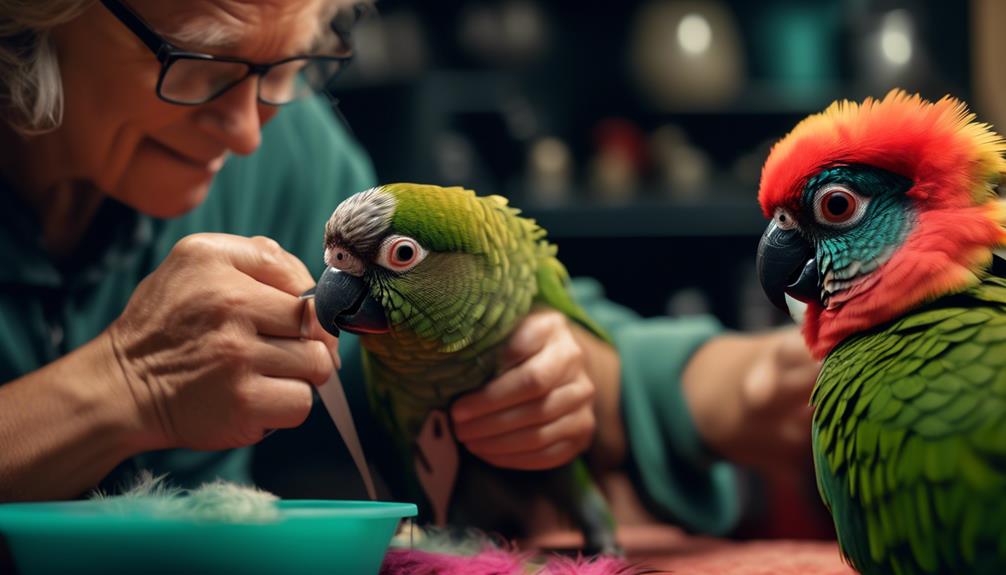
When it comes to the health and care of Patagonian Conures, there are a few important things to keep in mind.
Firstly, these birds are robust and adaptable, but they still require basic care to live a healthy life.
Mental stimulation is crucial for their well-being, so make sure to provide them with rope toys, perches, wooden playthings, and puzzle toys to keep them entertained.
Additionally, they need a lot of space to thrive, so consider providing them with a roomy cage or aviary, or allow them to fly freely around the house under supervision.
With proper care, these vibrant and playful birds can live up to 35 years and bring joy to your life.
Personality and Behavior
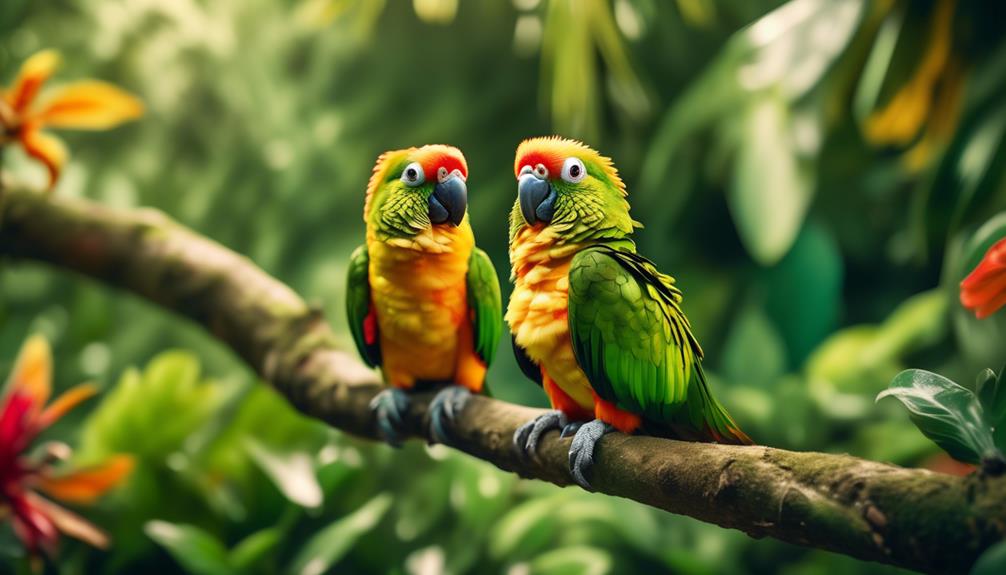
Now let’s explore the lively and endearing personality of Patagonian Conures. These vibrant birds have a unique set of behaviors and traits that make them a joy to have as pets.
- Playful and entertaining: Patagonian Conures are naturally playful and love to engage in interactive activities. They enjoy playing with toys, solving puzzles, and performing goofy tricks that will keep you entertained for hours.
- Affectionate and cuddly: These birds form deep bonds with their owners and thrive on human interaction. They love to be petted, enjoy head scratches, and even belly rubs. Their cuddly nature makes them excellent companions.
- Sociable and outgoing: Patagonian Conures are highly social birds and enjoy being the center of attention. They aren’t shy and will readily interact with family members and visitors, making them a great addition to any household.
- Vocal and expressive: These conures are known for their vocal abilities and mimicry skills. They can repeat basic words and sounds accurately, adding a touch of charm and entertainment to your home.
Size and Lifespan
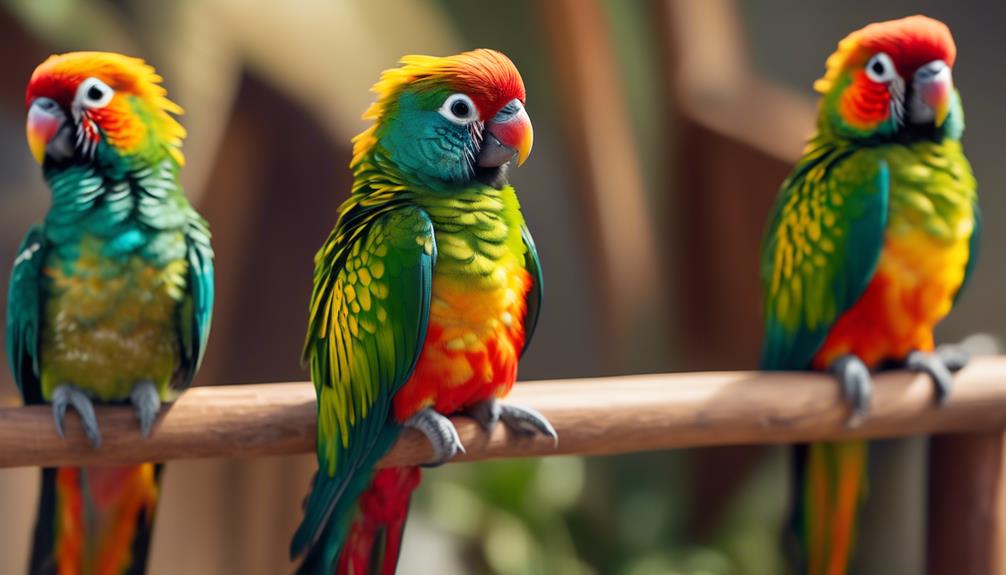
Patagonian Conures exhibit a remarkable size and have a lifespan of 35+ years. These parrots grow to about 18 inches in length, making them quite large compared to other conure species. With their robust and heavily built bodies, they are truly a sight to behold. To give you a better idea of their size and lifespan, here is a table:
| Size | Lifespan |
|---|---|
| 18 inches | 35+ years |
Their long tails add to their majestic appearance, making them stand out among other birds. With proper care and attention, these vibrant creatures can live for over three decades. It’s important to provide them with enough space and mental stimulation to keep them healthy and happy throughout their long lives.
Bird Species and Colors
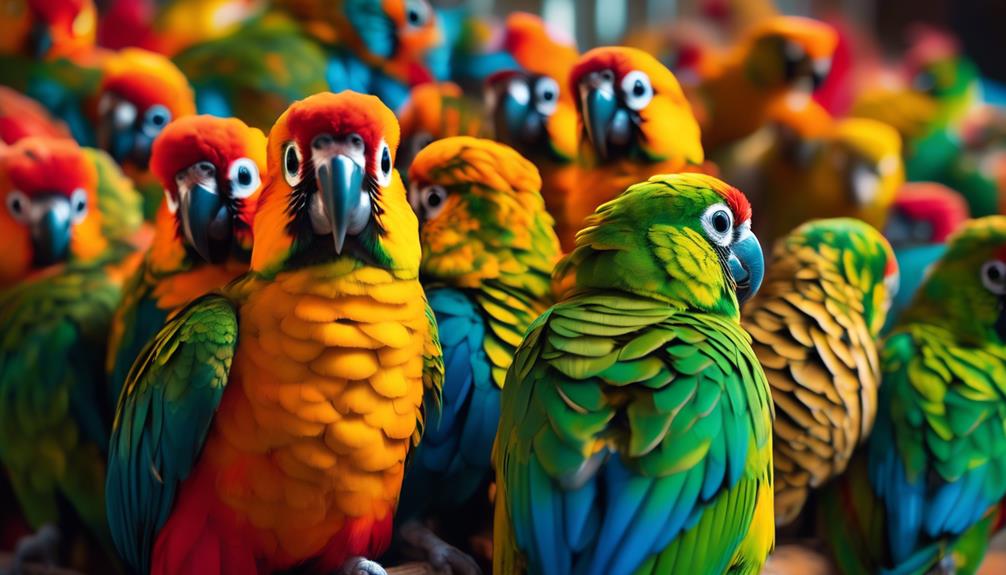
The Patagonian Conures belong to the parrot family and are known for their vibrant colors. These colorful birds are a sight to behold with their dark green feathers and colorful details. Their stunning appearance is one of their most distinguishing features.
Here are some key points about their bird species and colors:
- Variety of Colors: Patagonian Conures showcase a range of colors, from deep greens to bright yellows and blues. Their feathers are beautifully adorned with intricate patterns and striking hues.
- Parrot Family: These conures are part of the parrot family, which means they share many characteristics with other parrot species. They have a strong beak, zygodactyl feet, and the ability to mimic sounds.
- Vibrant Plumage: The vibrant colors of the Patagonian Conures not only make them visually appealing but also allow them to blend in with their natural surroundings in the savannahs and grasslands of Argentina and Chile.
- Colorful Personalities: Just like their colorful feathers, these birds have lively and colorful personalities. They are known to be playful, affectionate, and highly social creatures.
The stunning colors of the Patagonian Conures make them a popular choice among bird enthusiasts. Their vibrant plumage adds an element of beauty to any aviary or bird room.
Native Habitat and Adaptability

With their vibrant plumage and lively personalities, Patagonian Conures have captured the hearts of bird enthusiasts.
But now, let’s explore their native habitat and adaptability. These beautiful birds are native to parts of Argentina and Chile, thriving in arid and harsh conditions. They prefer nesting in savannahs and open grasslands.
Patagonian Conures are known for their adaptability, making them suitable for aviaries, bird rooms, and roomy cages. However, they require a lot of space and mental stimulation to stay healthy and happy. They can also fly freely around the house, but supervision is necessary to avoid accidents.
These robust and adaptable birds can live up to 35 years with basic care and enjoy rope toys, perches, and wooden playthings for mental stimulation.
Suitable Living Environment
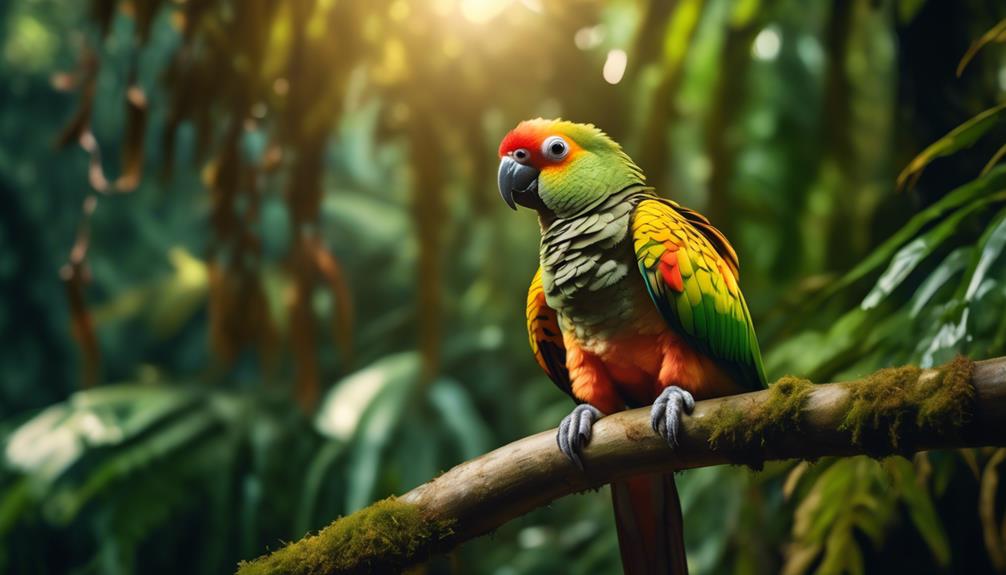
What is the ideal living environment for these vibrant and playful Patagonian Conures? Here are four key factors to consider:
- Space: Patagonian Conures require a lot of space to thrive. They’re best suited for aviaries, bird rooms, or roomy cages where they can fly freely. Lack of space can lead to lethargy, obesity, and health issues.
- Mental Stimulation: These intelligent birds need mental stimulation to stay happy and healthy. Provide them with rope toys, perches, wooden playthings, and puzzle toys to keep their minds engaged.
- Supervision: Due to their playful and curious nature, Patagonian Conures require supervision to avoid accidents. Ensure their living environment is safe and secure.
- Human Interaction: Patagonian Conures bond deeply with their owners and enjoy cuddles, head scratches, and belly rubs. They thrive in a household setting where they can interact with humans on a daily basis.
Creating an ideal living environment that meets these criteria will help ensure the happiness and well-being of your Patagonian Conure.
Dietary Needs and Exercise
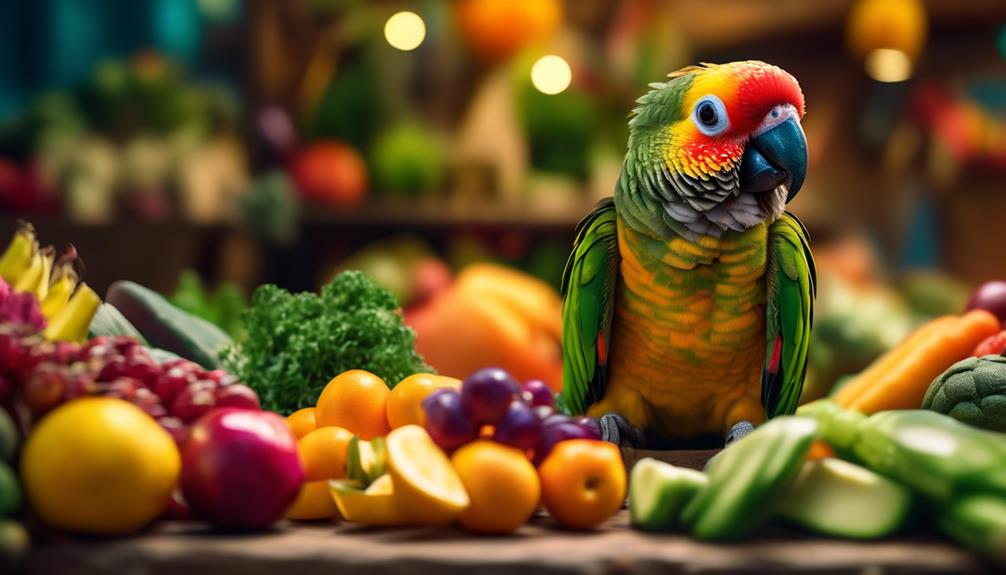
To meet the dietary needs and exercise requirements of your Patagonian Conure, it is important to provide a balanced and varied diet along with regular physical activity. These vibrant birds thrive on a diet that consists of a mix of seeds, pellets, fresh fruits, and vegetables. Here is a table that outlines the key components of a healthy Patagonian Conure diet:
| Food Group | Examples | Benefits |
|---|---|---|
| Seeds | Sunflower seeds, safflower seeds | High in healthy fats and essential nutrients |
| Pellets | Nutri-Berries, organic pellets | Provide balanced nutrition |
| Fruits | Apples, oranges, berries | Rich in vitamins and antioxidants |
| Vegetables | Carrots, broccoli, spinach | High in fiber and essential minerals |
| Treats | Nuts, dried fruits, whole grain crackers | Offer variety and mental stimulation |
In addition to a proper diet, regular exercise is crucial for the overall well-being of your Patagonian Conure. Make sure to provide ample opportunities for physical activity, such as supervised flying time outside the cage, climbing toys, and interactive play sessions. Engaging in these activities will help keep your bird mentally stimulated, physically fit, and happy.
Bonding With Humans and Playfulness

Now let’s explore how Patagonian Conures form bonds with humans and exhibit their playful nature. These vibrant birds have a natural affinity for connecting with their human companions, and they thrive on love and attention.
Here’s how they bond with humans and showcase their playful side:
- Affectionate Nature: Patagonian Conures are known for their cuddly and affectionate behavior. They enjoy being close to their owners, and they eagerly seek out head scratches and belly rubs.
- Playful Antics: These conures are naturally entertaining and love to engage in playful activities. They enjoy playing with toys, especially ones that provide mental stimulation like rope toys and puzzle toys.
- Bonding Through Tricks: Patagonian Conures are quick learners and enjoy showing off their tricks. Teaching them simple tricks like waving or spinning can strengthen the bond between you and your feathered friend.
- Social Interaction: These birds thrive on social interaction and love being a part of the family. Including them in daily activities and spending quality time with them will further deepen your bond and bring out their playful nature.
Frequently Asked Questions
Can Patagonian Conures Be Kept in Small Cages or Apartments?
No, Patagonian Conures cannot be kept in small cages or apartments. They require a lot of space and mental stimulation. Lethargy, obesity, and health issues can arise without enough space. Supervision is also needed to avoid accidents.
What Are the Common Health Issues That Patagonian Conures May Face?
Common health issues Patagonian Conures may face include lethargy, obesity, and various health issues if not given enough space for exercise. It is important to provide mental stimulation, a balanced diet, and regular vet check-ups to ensure their well-being.
How Do Patagonian Conures Communicate With Each Other?
Patagonian Conures communicate with each other through vocalizations and mimicry. They can repeat basic words and sounds accurately and are expressive and receptive to music. Their charming and entertaining nature makes them popular pets.
Are Patagonian Conures Prone to Feather Plucking?
Yes, Patagonian Conures can be prone to feather plucking if they are stressed or bored. It’s important to provide them with mental stimulation, plenty of space, and a variety of toys to prevent this behavior.
Can Patagonian Conures Be Trained to Do Tricks or Perform Certain Behaviors?
Yes, Patagonian Conures can be trained to do tricks and perform certain behaviors. With patience and positive reinforcement, you can teach them to wave, fetch, and even speak basic words. They are intelligent and eager to learn.
Are Rock Parrots Similar to Patagonian Conures in Behavior and Habitat?
Rock parrots and Patagonian conures both inhabit the vibrant world of parrot species. However, their behaviors and habitats differ significantly. Rock parrots are known for their preference for rocky coastal areas, while Patagonian conures are commonly found in grasslands and near water sources. Their behavioral patterns also vary according to their respective habitats.
Conclusion
In conclusion, Patagonian Conures are captivating birds with their vibrant plumage and playful personality. They require proper care and attention to ensure their wellbeing, including mental stimulation and appropriate toys.
These birds have the ability to mimic speech and sounds, adding to their charm. With their adaptability to various environments and their deep bond with humans, Patagonian Conures make a delightful addition to any household.
So, embark on this captivating journey and discover the vibrant world of these magnificent birds.

